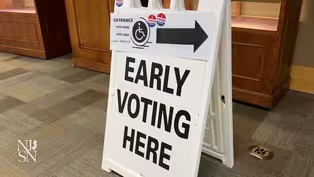NJ Spotlight News
NJ Spotlight News: June 4, 2025
6/4/2025 | 26m 46sVideo has Closed Captions
Watch as the NJ Spotlight News team breaks down today’s top stories.
We bring you what’s relevant and important in New Jersey news and our insight. Watch as the NJ Spotlight News team breaks down today’s top stories.
Problems playing video? | Closed Captioning Feedback
Problems playing video? | Closed Captioning Feedback
NJ Spotlight News is a local public television program presented by THIRTEEN PBS
NJ Spotlight News
NJ Spotlight News: June 4, 2025
6/4/2025 | 26m 46sVideo has Closed Captions
We bring you what’s relevant and important in New Jersey news and our insight. Watch as the NJ Spotlight News team breaks down today’s top stories.
Problems playing video? | Closed Captioning Feedback
How to Watch NJ Spotlight News
NJ Spotlight News is available to stream on pbs.org and the free PBS App, available on iPhone, Apple TV, Android TV, Android smartphones, Amazon Fire TV, Amazon Fire Tablet, Roku, Samsung Smart TV, and Vizio.
Providing Support for PBS.org
Learn Moreabout PBS online sponsorship>> Major funding for "NJ Spotlight news" is provided in part by NJM insurance group, serving the insurance needs of businesses and residents for more than 100 years.
Horizon Blue Cross Blue Shield of New Jersey, an independent licensee of the Blue Cross and blue shield Association.
And by the PSEG foundation.
Anchor: Tonight, defunding public media.
President Trump asked Congress to slash funding in the fight had to Capitol Hill.
And less than one week until primary day and affordability seems to be a key issue for voters as they had the ballot box.
>> The governorship in this case is almost a poisoned chalice.
There's no good solution.
Whoever ins of being governor will be faced with cutting services, and/or raising taxes for Anchor: And rising energy cost.
The governor and legislators announced new solar development plans in an effort to keep utility bills down.
>> This will directly lower energy costs for our neighbors.
Secondly, they are incredibly easy to build.
You can bring them online faster than any other source of energy.
Anchor: And police spending.
A record study finds a correlation between increased police spending and deaths of black Americans.
>> Last decades, we've seen increases in police funding and increases in suicide and increases in police perpetrated shooting.
Anchor: "NJ Spotlight News" begins right now.
♪ >> From NJPBS Studios, this is "NJ Spotlight News" with Briana Vannozzi.
Anchor: Thanks for joining us, I am Joanna Gagis, Rhianna Vannozzi is off tonight.
We begin with some top headlines.
President Trump some Republicans in Congress moving to pull all federal funding for public media.
The White House Tuesday submitted a request to lawmakers to resend $1.1 billion that has already been dedicated to the Corporation for Public Broadcasting, which provides money to NPR and PBS.
NJPBS and NJ Spotlight News receive some of these funds.
The request allows the White House budget office to freeze the funds for 45 days while Congress debates whether to approve the cups permanently.
In the letter requesting the cuts, the budget director said federal funding "subsidizes a public media system that is politically biased and an unnecessary expense to the taxpayer."
The PBS CEO said in a statement the proposed cuts would "devastate" local PBS stations around the country.
In May, President Trump signed an executive order to block funds to local stations.
NPR and PBS have sued the administration to stop that order.
Aside from the cuts to public media, the rescission request also calls on Congress to cut more than $8 billion currently dedicated to foreign aid programs like HIV and AIDS prevention.
A new text message scam is hitting cell phones and you could be next.
Messages seem to be from the DMV, the old name for the state motor vehicle commission, and warn you have outstanding tickets and you could be subject to fines, have your drivers license suspended or face an increase at tolls.
These messages are fraudulent and intended to steal your information and your money if you go to the link provided.
A warning was issued earlier this week telling people not to click on any link provided in those texts and never share any personal information through these messages.
If you would like to visit the actual motor vehicle website, you can go to njmvc.
After several recent flash mobs, governor signed a bill that would outlaw this kind of behavior.
It is against anyone who tries to incite fear or reduce -- refuse arrest.
Lawmakers say the bill is designed to give law enforcement more tools and clarity when responding to large gatherings, especially those organized on social media, or when responding to mayhem like we saw in Seaside Heights on Memorial day, were 73 people were arrested and three stabbed near the boardwalk.
Lawmakers say the goal of the bill is to help reduce the risk of dangerous situations before they escalate, especially as the busy summer season begins.
In the final stretch of the primary race we are looking at the issues driving voters to the polls and perhaps the most urgent of the day and the entire race has been affordability.
Brenda Flanagan takes a look at how each party and each candidate has made affordability central to their campaign.
Reporter: In jerseys primary election, the primary concern in polls are affordability.
High taxes and rising costs on everything.
Taxpayers feel the squeeze and Trump Administration funding cuts will only sharpen the pain.
New Jersey candidates for governor on both sides of the Al phase tough budget mathematics says this pollster.
>> The governorship in this case is almost a poisoned chalice.
There is no good solution.
Whoever winds up being governor will be forced with cutting services and/or raising taxes and it won't be popular.
Reporter: For the five Republican candidates, it is a political minefield.
All promised to cut waste and pork.
Others would adjust income tax brackets to help lower income folks.
Republicans would also lower corporate taxes and make Jersey more business friendly.
>> Show me a state that doesn't have a Department of Commerce and I will show you estate perceived as not being pro-business.
Under the governor we will establish the Department of Congress -- Department of commerce.
Reporter: He has won the presidents endorsement.
>> If were going to have any new departments in government there is only one, we need NJ doge, we need to say whatever you are doing federally we need to bring it to Jersey.
>> Hold on, this is not the forum.
>> Elon Musk will not be in my, I tell you that.
I will not bring national politics into Jersey.
Reporter: Both support the stay in J property tax program for seniors but Spady calls it a gimmick.
Democrats also supported but they need to chart a fiscal course that's not Phil Murphy 3.0 voters want change says this writer.
>> I think the closest you will hear two raising taxes is when Baraka or Phillips say we need to get more out of our wealthiest residents, we are not taxing them enough.
Reporter: Both progressives would restructure income tax brackets, saving money for low and middle income folks and create a new top levy of up to 14% for those making 10 million or more.
>> You can't hide in the middle, we have to make billionaires pay their fair share.
>> I will fight Medicaid cuts by using the state surplus and raise the minimum wage to $18 an hour and give small businesses tax credits to pay for it.
Reporter: Both also prioritize aggressive affordable housing plans.
Meanwhile, Mikey Cheryl would boost loans and credits for homebuyers and reap savings by consolidating services like firefighting and animal control.
She's also focused on family tax credits.
>> I will expand the child tax credit because when we did that at the federal level it cut child poverty and health and lowered the cost of living for so many parents.
>> She's been running as the front runner, she doesn't need to make way.
The worst thing she can do is get really specific.
Reporter: Amongst more conservative Democrats, Steve Sweeney has vowed no tax increases during his term.
A congressman has promised to call back federal funding cuts and slash taxes by bringing down waste.
>> It's great to have another Republican candidate.
[LAUGHTER] Reporter: Specifics are hard to come by.
>> No one wants to admit they are cutting something or not, they want to say this is a question of waste, it's a question of fraud, who is eligible.
Reporter: He says voting, normally light for primaries, will be about whose message resonated more.
I'm Brenda Flanagan.
Anchor: Keep it right here for NJ decides primary night election coverage next Tuesday, we are live at 8:00 with all the results, with reporters at different campaign headquarters.
We will have political analysis in the studio.
That's next Tuesday right here on NJPBS.
Also streaming on our YouTube channel and digital site until the last race is called.
New Jersey residents have yet to get the bill but we are already living with the new pricing model that will spike in energy costs at the end of the month.
Cherry Hill is considering a community solar project that will pump more energy into the grid and drive down costs especially for low income residents.
While they prepared a vote on that tomorrow, Governor Murphy visited an existing solar project to see the impact it's having.
Ted Goldberg was there.
Reporter: This warehouse in Perth Amboy has been covered in solar panels for more than four years.
>> It will last for 20 come in 25 years, which is about as long as you would expect the roof to last.
Reporter: The Board of utilities approved expanding the solar utility program to the tune of 250 additional megawatts, which could provide power to a few hundred thousand households statewide.
>> It feeds energy directly into the grid, and 400 homes in the community.
Most of those a low and moderate income.
>> Those are the most impacted.
Reporter: The mayor says this project, managed by solar landscape, has been a boon for residents.
>> 469 households in our city are seeing benefits.
On average they are saving more than 230 dollars a year on energy bills.
That's real help for families that need it.
>> This model is important because it meets our goal by delivering clean energy to residents while creating additional economic opportunities for the communities in which products are located.
Reporter: Governor Murphy stopped by the warehouse today.
>> We should be doing these up and down New Jersey.
>> We are quick to interconnect with existing infrastructure and the speed to market, in 12 months you can have projects operational to great powerful local communities.
Reporter: Nobody is saying not in my backyard to solar panels on rooftops, and Murphy says renting roofs for panels is good energy policy and good for the economy.
>> This will directly lower energy costs for our neighbors.
As we mentioned, they are incredibly easy to build good you can bring them online faster than any other source of energy.
And they create good paying, overwhelmingly union jobs.
Reporter: The panels can power the warehouse they sit on, the grid or do both.
All useful options as New Jersey looks for ways to generate more electricity as rates could jump this summer.
>> Rates will go up because we have more demand than supply.
That's good because the economy is growing, and we are making sure New Jersey continues to be a place people want to come.
>> There's not enough generation on the grid and the rooftops are the perfect place to put solar panels, and recognized first in New Jersey and a model across the country.
>> New Jersey has emerged as one of the largest producers of solar energy in the entire Northeast.
Last year for the first time ever we crossed five gigawatts of installed solar capacity.
Reporter: That's enough to power 750,000 homes.
There are 24 active locations right now with 101 under construction or in the works.
The next could come to Cherry Hill, when the zoning board votes on it tomorrow night.
I'm Ted Goldberg.
Anchor: It is widely believed that investing in policing and police activity helps keep communities safer.
A new study published by Rutgers might flip that on its head.
The study reveals first of the kind research that shows a correlation between police expenditures and suicide deaths among Black residents and police perpetrated killings of Black residents.
On the flipside, increase spending on housing reduces both death rates.
I'm joined by one of the study's authors, an associate professor at the Rutgers School of Public Health.
Thank you for taking the time to talk with us.
I know you used census data to conduct this study.
What can you expand about what you found between spending on policing and the rates on Black suicide and killings by police?
>> What we found in looking at police spending and other areas of spending, years in which police funding increased, the year following we saw Black suicide increase as well.
Anchor: There was always a one year delay?
Devin: We looked at two different delays, what was happening the next year and what was happening five years afterwards.
Anchor: We know that correlation does not equal causation.
Were you able to prove causation that because there was an increase in police spending there was a direct increase in Black killings and suicide?
Devin: Really important point, we are looking at correlation.
Anchor: You also looked at investments in housing and saw different outcome.
Explain that.
Devin: It was the opposite.
Of the effect we saw with police funding.
That was, increases in housing and community development funding were associated with decreases in Black suicide the next year.
Anchor: There's another piece of this I found interesting.
You looked at suicide among white students and there was a connection between investments in K-12 spending on education, but not the same for Black residents.
Can you explain?
Devin: We did find that increases in K-12 education funding were associated with decreases in suicide for white residents but not Black residents.
Anchor: What do you believe are the key takeaways, especially if you're giving advice to state or local municipal leaders?
Devin: Really important question.
We fund the police to do much more than homicide response and prevention.
We ask them to do mental health response, like showing up for those having mental health crises, like suicide attempt, substance use, and serious mental illness.
Estimates suggest about 25% of police work includes mental health response.
It's really important we understand the impact of what we are funding the police to do.
We've seen the responsibilities increase over time.
Over the last decade, the same time we've seen increases in police funding, we seen increases in suicide, increases in police perpetrated shooting and killing.
Anchor: What is your message?
Is it that the funding needs to be spent differently, on mental health resources or other resources in the community?
Devin: I think we need to look at potential alternatives to mental health response.
There are civilian led response teams throughout the U.S..
They tend to be underfunded and we don't have great data on their impact.
We did find there are important alternatives that can potentially support, reduce suicide and police perpetrated shooting, police perpetrated killing, and that is housing and community development and education.
Anchor: Devon English, associate professor at the Rutgers school of public health, thank you.
As the federal government continues to scale back funding of programs, the latest cut would cut funds for the job Corps program across the country.
Job Corps is a free job-training program run through the Department of Labor that helps young people 16 through 24 develop job readiness goes for vocational careers.
The Labor Secretary said this came after a search of "serious incident reports" alleging problematic behavior among participants.
We spoke about participants in the program about the impact and what the funding cuts would mean.
>> It's a lot of frustration with the kids because none of them have no place to go, they don't have homes, they don't have jobs.
They put all of their effort into coming here.
Reporter: 19-year-old Grace says she was only 37% of the way through her clinical medical assistant training when she learned the U.S. Department of Labor would be officially shutting down the job Corps program nationwide.
She joins fellow students at program sites across the country feeling frustrated and uncertain about their futures.
>> Before I got here I was homeless on the street.
Job Corps saved my life on a different type of level.
I just got my certifications yesterday for carpentry.
My fear is a lot of students don't have places to go at all.
As soon as we heard the news, students were crying in their dorms.
>> I was genuinely devastated.
I am 67% done with my trade and now it's honestly very upsetting because I can't get the career I came here for.
Reporter: Job Corps is a training program for low income and young adults run by the Department of Labor designed to help young people 16 to 24 gain valuable schools -- skills for the workforce.
>> I dream of being a mechanic and coming here would have changed that.
Reporter: What are you concerned about now?
>> Where I will go after this.
Fortunately, I was able to get all of my certificates but a lot of people don't have that blessing.
Some people came in not long ago and some people aren't even at 50% so they can get pushed through and get the certificates they need.
Reporter: The decision is facing backlash from monikers and program leaders alike -- from lawmakers and program leaders alike.
>> We serve annually 417 students per year.
Reporter: How many are now at risk?
>> Every one of them.
They are at risk of losing their education, at risk of not having shelter, at risk of not having three hot meals per day, at risk of losing health care.
We provide wellness care for students.
They are at risk of going back to the streets where they tried to escape.
They are losing a safety net.
Reporter: The U.S. Department of Labor's employment and training administration released the first ever job Corps transparency report that reviewed financial performance and operational costs from the latest data from 2023.
The Labor Secretary cited a search in serious incident reports as a key factor behind the decision to shut down the program.
In 2023 alone, nearly 50,000 incidents were reported, including violence, argues an inappropriate sexual behavior, saying a startling number of serious incident reports and our in-depth fiscal analysis revealed the program is no longer achieving the intended outcomes that students deserve.
We remain committed to ensuring all participants are supported through the transition and connected with the resources they need to succeed as we evaluate the program possibilities.
>> I am a former Job Corps student, I attended 20 years ago and we are celebrate bring 60 years of job Corps this year.
Reporter: As a former participant, he points to his own journey as proof of the impact.
>> Look at me, I am a success story.
I went from at risk to director of the same program that helped me and I'm working on my PhD.
Reporter: He stresses that it's more than just an occasional program, a vital lifeline for low income students offering training in high demand careers and a pathway to lasting stability.
He sets advocates are planning a rally to raise awareness and support.
Meantime he's calling on community partners to step up and help students navigate the transition as the program winds down.
I am Raven Santana.
Anchor: That will do it for us.
You can download our podcast wherever you listen and watch any time by subscribing to the NJ Spotlight News YouTube channel.
You can follow us on Instagram and blue skies to stay up-to-date on the big headlines.
For the entire team, thank you for being with us, have a great night and we will see you tomorrow.
>> New Jersey Education Association, making public schools great for every child.
RWJBarnabas Health, let's be healthy together.
New Jersey realtors, the voice of real estate in New Jersey.
More information online at njrealtor.com.
And Orsted, committed to delivering clean, reliable, American-made energy.
>> For more than a century New Jersey realtors have worked to advocate for homeownership and private property rights.
We work on the issues that matter.
Here in Trenton and in your neighborhood.
As the voice for real estate New Jersey, we safeguard homeownership, strengthen communities and reinforce our economy.
Learn more at njrealtor.com.
>> Public service is what we do at the PSEG foundation.
We are committed to empowering communities.
We work hand-in-hand with you, our neighbors, to educate young people, support research, environment of sustainability and equitable opportunities.
Provide training and other services all over New Jersey and Long Island.
Uplifting communities, that is what drives us.
♪ ♪ ♪
Decision to shutter Job Corps stuns students, administrators
Video has Closed Captions
Clip: 6/4/2025 | 4m 58s | ‘My biggest fear is that a lot of students don’t have places to go at all’ (4m 58s)
Murphy touts community solar program as energy costs climb
Video has Closed Captions
Clip: 6/4/2025 | 3m 57s | ‘We should be doing these morning, noon and night, up and down New Jersey’ (3m 57s)
NJ primary 2025: Candidates for governor on affordability
Video has Closed Captions
Clip: 6/4/2025 | 5m 1s | Voters are worried about high taxes and rising costs (5m 1s)
Police spending tied to Black residents' deaths, study says
Video has Closed Captions
Clip: 6/4/2025 | 5m 3s | Interview: Devin English, associate professor, Rutgers University (5m 3s)
Providing Support for PBS.org
Learn Moreabout PBS online sponsorship
- News and Public Affairs

Top journalists deliver compelling original analysis of the hour's headlines.

- News and Public Affairs

FRONTLINE is investigative journalism that questions, explains and changes our world.












Support for PBS provided by:
NJ Spotlight News is a local public television program presented by THIRTEEN PBS



